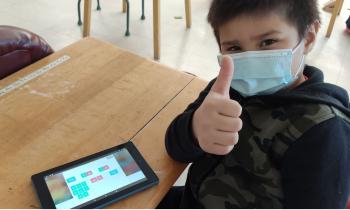Image Caption
Local Journalism Initiative Reporter
Windspeaker.com
Indigenous children in Ontario and British Columbia are expected to benefit from a $200,000 grant from a telecommunications company.
Funding provided through the TELUS Friendly Future Foundation will allow officials from Innovations for Learning to expand its programming to youth in the two provinces.
“It will allow us to support another 100 children in B.C. and to expand it to another 200 in northern Ontario,” said Fabrice Grover, the executive director of Innovations for Learning.
Innovations for Learning is a registered charity that aims to improve the literacy rates of youth across the country.
Statistics show that every year across Canada there are about 100,000 children who finish Grade 3 unable to read or write. As a result, their development is impacted in a significant way and they are less likely to be able to keep on top of their academics.
Studies have shown those who are not literate in their early years of school will be 3.5 times less likely to graduate from high school.
Officials from the World Literacy Foundation have indicated the COVID-19 pandemic has resulted in the biggest educational disruption in history.
As a result, action is required, especially in Indigenous, marginalized and remote communities where children have been disproportionately impacted due, in part, to connectivity issues.
“There’s also low levels of literacy across the board,” Grover said of those in some Indigenous communities. “The literacy gap has existed in Canada for decades.”
Innovations for Learning utilizes a program called TutorMate. It provides one-on-one assistance via computers and allows young students to get assistance in phonics, sight word acquisition, fluency and comprehension.
“We use volunteer reading coaches,” Grover said. “They dial into a classroom and spend 30 minutes a week to help (students) develop a love of reading and reading fluency.”
Support provided through the TutorMate program allows students to receive individual instruction, which is often something teachers do not have time to provide.
Grover said the additional tutoring is not intended to take the place of learning provided by classroom teachers.
“They can achieve what a teacher achieves at a fraction of the cost,” he said. “They don’t replace a teacher. They complement a teacher.”
Innovations for Learning was established in Illinois in 1993. Besides Canada and the United States, the program is also utilized at schools in the United Kingdom.
More than 5,000 volunteers currently help out with the program by providing literary assistance to children.
“It’s a very promising model,” Grover said. “The results are extraordinary.”
Mick Staruck, the director of education for the Wiikwemkoong Board of Education, is among those who speak highly of the program.
TutorMate has been available at Wiikwemkoong Junior School, located on Wiikwemkoong Unceded Territory on Manitoulin Island, Ont. since 2018.
“This has truly been the most collaborative and respectful partnership,” Staruck said. “We feel we’re truly partners with Innovations for Learning.”
Other Indigenous schools in the Manitoulin area that have also used the program are Biidaaban School on Sagamok Anishinawbek First Nation, Shawanosowe School in Whitefish River First Nation, Lakeview School on M’Chigeeng First Nation, Little Current Public School and St. Joseph’s Anishnabek School on Sheshegwaning First Nation.
“I know teachers are incredibly fond of it and would give testimonials for it,” Staruck said.
Among those who will benefit from the recent TELUS grant are students from seven classrooms at schools in Lac Seul First Nation in northern Ontario. Others in the province who will have access to the program are students from the Moose Cree First Nation school, Ministik Public School, located in the fly-in community of Moose Factory.
Staruck is thrilled others besides those from his school board will now have the opportunity to improve their literacy.
“It’s not just about us,” he said. “I know they are going to have the same results as we are.”
Those in British Columbia that will have the program made available are part of the Ripple Rock Elementary/ Kʷak̓ʷala and Lik̓ʷala Bilingual K-2 program located in Campbell River.
“We still have room for more schools to join us as part of the TELUS Friendly Future Foundation grant expansion,” Grover said. “We warmly welcome inquiries from education leaders that would be interested in collaborating on the storybook project and that would also be interested in receiving this subsidized 1:1 reading support for their 5- to 7-year-old emerging readers in SK-Grade 2.”
Local Journalism Initiative Reporters are supported by a financial contribution made by the Government of Canada.

